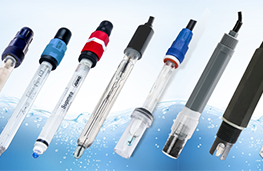At its core, industrial pH probes are sensors that measure the acidity or alkalinity of solutions, colloids, and suspensions in various industrial processes. The measurement of pH levels is essential in many industrial sectors, including food and beverage, pharmaceutical, chemical processing, and wastewater treatment.
In this article, we will take a comprehensive look at industrial pH probes, their applications, and how they work. We will also explore the different types of industrial pH probes, their maintenance, and calibration procedures.

An industrial pH probe, also known as a pH sensor or pH electrode, is a sensor used to measure the hydrogen-ion activity in a liquid or solution. pH probes consist of a pH-sensitive electrode, a reference electrode, and a high-impedance meter or pH meter.
The pH-sensitive electrode is a glass electrode with a thin membrane that responds to changes in hydrogen-ion activity. The reference electrode is typically a silver-silver chloride electrode that maintains a constant voltage. The high-impedance meter or pH meter measures the difference in voltage between the pH-sensitive electrode and the reference electrode.
Industrial pH probes are essential tools in many industrial applications, including:
Food and Beverage Processing: pH measurement is crucial in the production of beverages, including beer, wine, and soft drinks. pH levels also play a critical role in cheese-making, yogurt production, and bread-making.
Pharmaceutical Industry: In the pharmaceutical industry, pH measurement is crucial in drug production and development. The pH level can affect the solubility, stability, and efficacy of drugs.
Chemical Processing: pH measurement is essential in chemical processing to ensure product quality, optimize chemical reactions, and prevent corrosion.
Wastewater Treatment: pH measurement is a critical parameter in wastewater treatment. The pH level can affect the efficiency of biological treatment processes and the discharge of treated effluent.
There are different types of industrial pH probes available, each designed for specific applications. The most common types include:
Glass pH Probes: Glass pH probes are the most common type of pH probes. They are suitable for most applications, including aqueous solutions, acids, and bases.
Epoxy pH Probes: Epoxy pH probes are suitable for harsh chemical environments, including concentrated acids and bases.
Combination pH Probes: Combination pH probes consist of a pH electrode and a reference electrode in a single body. They are easy to use and suitable for most applications.
Solid-State pH Probes: Solid-state pH probes are suitable for applications where the sample solution is not aqueous or contains solvents.
Proper maintenance and calibration of industrial pH probes are crucial for accurate and reliable pH measurements. Here are some tips for maintaining and calibrating industrial pH probes:
Always store pH probes in a proper storage solution when not in use. The storage solution helps to maintain the pH-sensitive membrane and prevent drying out.
Clean the pH probes regularly using an appropriate cleaning solution. Avoid using harsh chemicals that can damage the pH-sensitive membrane.
Calibrate the pH probes regularly using standard buffer solutions. The frequency of calibration depends on the application and the pH probe’s usage.
Replace the pH probes as needed. pH probes have a limited lifespan and deteriorate over time.
Industrial pH probes play a critical role in many different industries, from pharmaceuticals to food production to wastewater treatment. These devices are used to measure the acidity or alkalinity of a substance, and they must be calibrated and maintained properly to ensure accurate readings.
When selecting an industrial pH probe, it’s important to consider factors such as the type of application, the temperature and pressure requirements, and the compatibility with the substances being measured. There are many different types of pH probes available, each with its own strengths and weaknesses, so it’s important to do your research and choose the right probe for your specific needs.
If you’re interested in learning more about industrial pH probes and how to use them effectively, there are many resources available online. By taking the time to educate yourself on the best practices for pH measurement and calibration, you can ensure that your industrial processes run smoothly and produce high-quality products.
In the end, investing in a high-quality industrial pH probe is a smart choice for any business that relies on accurate pH measurements. By choosing the right probe and following the best practices for calibration and maintenance, you can improve your efficiency, reduce your costs, and ensure the quality of your products.